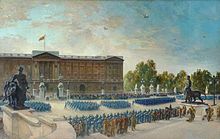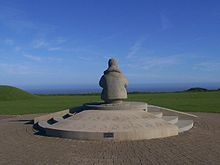|
The Few
 The Few were the airmen of the Royal Air Force (RAF) and the aviators of the Fleet Air Arm, Royal Navy (RN) who fought the Battle of Britain in the Second World War. The term comes from Winston Churchill's phrase "Never, in the field of human conflict, was so much owed by so many to so few." It also alludes to Shakespeare's famous speech in his play, Henry V: "We few, we happy few, we band of brothers..."[1] AircrewNearly 3,000 men were awarded the "Battle of Britain" clasp. As six of the seven longest surviving veterans of the battle (Squadron Leader John Hart, Flight Lieutenant Archie McInnes, Flight Lieutenant Maurice Mounsdon, Air Vice-Marshal John Thornett Lawrence, Wing Commander Paul Farnes and Flight Lieutenant William Clark) died between June 2019 and May 2020 as of 8 May 2020, only one survivor of The Few is still living (Flying Officer John Hemingway).[2][3][4][5][6][7][8][9] By one tally, British RAF aircrew numbered 2,353 (80%) of the total of 2,927 flyers involved, with 407 Britons killed from a total of 510 losses. The remainder were not British, many coming from parts of the British Empire (particularly New Zealand, Canada, Australia, and South Africa), as well as exiles from many conquered European nations, particularly from Poland and Czechoslovakia. Other countries supplying smaller numbers included Belgium, France, Ireland (serving in the RAF as Ireland was officially neutral, but heavily biased towards the allies), Southern Rhodesia and the United States.[10][11][12][13] Legacy  Winston Churchill summed up the effect of the battle and the contribution of RAF Fighter Command, RAF Bomber Command, RAF Coastal Command and the Fleet Air Arm with the words, "Never in the field of human conflict was so much owed by so many to so few".[14] Pilots who fought in the battle have been known as The Few ever since; at times being specially commemorated on 15 September, "Battle of Britain Day". On this day in 1940, the Luftwaffe embarked on their largest bombing attack yet, forcing the engagement of the entirety of RAF 11 Group in defence of London and the South East, which resulted in a decisive British victory that proved to mark a turning point in Britain's favour.[15][16] As of 2022, there is only one surviving member of the group still alive, John Hemingway.[17] The Horrible Histories song called “The Few” commemorates these airmen and women, including Sir Douglas Bader. Memorials  The aircrew are remembered on the Battle of Britain Memorial, Capel-le-Ferne, Kent, and their names are listed on the Battle of Britain Monument in London. The Battle of Britain Roll of Honour is held in Westminster Abbey in the RAF Chapel, and is paraded annually during the Service of Thanksgiving and re-dedication on Battle of Britain Sunday.[18] There is a preserved Hawker Hurricane fighter aircraft known as "The Last of The Many"—a reference to the 1942 film The First of the Few starring Leslie Howard as R.J. Mitchell, designer of the Spitfire—which flies as part of the Battle of Britain Memorial Flight, along with a Supermarine Spitfire that flew in the Battle (one of five Spitfires in the Memorial Flight). As the Hurricane was the last production model of that type, it did not itself fly in the Battle. In 2022 a sculpture, the Spirit of the Few Monument, was unveiled at the Kent Battle of Britain Museum.[19] StatisticsThe Battle of Britain was considered officially by the RAF[20] to have been fought between 10 July and 31 October 1940.
Leading acesThe leading aces of the Battle of Britain (between 10 July and 31 October 1940) were: [21]
Other notable Battle of Britain pilots
In popular cultureThe Few, a novel by Alex Kershaw, tells the stories of the men who flew in the Battle of Britain. As of 2003[update], a Hollywood film similarly named The Few was in preparation for release in 2008, based on the story of real-life U.S. pilot Billy Fiske, who ignored his country's neutrality rules and volunteered for the RAF. A Variety magazine outline of the film's historical content[23] was said in The Independent to have been described by Bill Bond, who conceived the Battle of Britain Monument in London, as "Totally wrong. The whole bloody lot."[24] "One of the Few", a sony by British band Pink Floyd from their album The Final Cut (1983), describes a war veteran's return from the battlefield, specifically a pilot from the Battle of Britain, to pursue teaching, which connects to "The Hero's Return", another song from the album which is sung from the veteran's perspective. ReferencesNotes
Bibliography
Further reading
External linksWikimedia Commons has media related to The Few. Wikisource has original text related to this article:
|